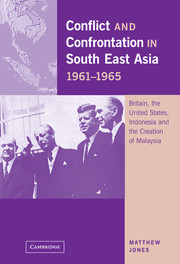 Conflict and Confrontation in South East Asia, 1961–1965
Conflict and Confrontation in South East Asia, 1961–1965 Book contents
- Frontmatter
- Contents
- List of maps
- Preface and acknowledgements
- List of abbreviations
- South East Asia
- Indonesia and Malaysia
- Introduction: Britain, the United States and the South East Asian setting
- Part I Build-up
- Part II Outbreak
- Part III Denouement
- 9 The diplomacy of confrontation, Anglo-American relations and the Vietnam War, January–June 1964
- 10 Escalation, upheaval and reappraisal, July 1964–October 1965
- Conclusion: The Western presence in South East Asia by the 1960s
- Bibliography
- Index
10 - Escalation, upheaval and reappraisal, July 1964–October 1965
Published online by Cambridge University Press: 25 July 2009
- Frontmatter
- Contents
- List of maps
- Preface and acknowledgements
- List of abbreviations
- South East Asia
- Indonesia and Malaysia
- Introduction: Britain, the United States and the South East Asian setting
- Part I Build-up
- Part II Outbreak
- Part III Denouement
- 9 The diplomacy of confrontation, Anglo-American relations and the Vietnam War, January–June 1964
- 10 Escalation, upheaval and reappraisal, July 1964–October 1965
- Conclusion: The Western presence in South East Asia by the 1960s
- Bibliography
- Index
Summary
The period between the summer of 1964 and the autumn of 1965 saw the position of the Western powers in South East Asia transformed once more. From the British perspective, they now approached the region no longer as a power with formal colonial interests and responsibilities, but as one tied to the area by treaty commitments, a sense of obligation to regional friends and the need to preserve and show solidarity with the Americans. British relations with Kuala Lumpur were subject to the kind of strains experienced in 1963, but in even more pronounced fashion, as the Malaysian Government ran the affairs of the new Federation in ways that offended London's sensibilities and seemed to threaten the fragile sense of national unity that had been established by the conflict with Indonesia. Indeed, the old colonial ties and patterns of thinking were being supplanted in Malaysian official circles by a greater willingness to demonstrate independence from the overbearing advice and presence of the British (though the need to maintain close ties for the purposes of security was still widely and uncomfortably acknowledged). This was a situation the British did not relish but had anticipated since at least the late 1950s, having never taken the preservation of a moderate and pro-Western UMNO leadership for granted. By the mid-1960s, that conservative leadership still held sway under the Tunku, but its future disposition could not be assured, leading many to question how long the obtrusive British bases could be maintained before local hostility was generated and they were driven out.
- Type
- Chapter
- Information
- Conflict and Confrontation in South East Asia, 1961–1965Britain, the United States, Indonesia and the Creation of Malaysia, pp. 268 - 294Publisher: Cambridge University PressPrint publication year: 2001
